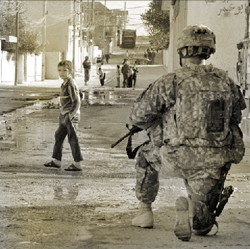ASKIAM
Senior Correspondent

WASHINGTON (FinalCall.com) – A U.S. Army sergeant, on his third tour of duty in Iraq has been charged in the May 11 killing of five other American service members at a military treatment center near Baghdad. Sgt. John Russell faces fi ve murder counts and one count of aggravated assault.
Sgt. Russell may have been suffering from Post Traumatic Stress Disorder (PTSD), a condition that has afflicted many troops after they have returned from the battlefield. Hundreds of soldiers have committed suicide while others have inflicted harm on family members and friends. Sgt. Russell had previously had his gun taken away from him by his commander, and may have taken the weapon from an MP escorting him from the clinic where he opened fi re after possibly being turned away from treatment.
“The commander of the suspect, that being Sergeant Russell, had taken his weapon away,” Army spokesman Maj. Gen. David Perkins told reporters, according to published reports. “He had experienced or had been referred to counseling approximately the week beforehand. And through that process, his commander had determined that it would be best for him not to have a weapon. The suspect was apprehended outside the clinic shortly after shots were heard.”
But the mother of one of the victims of the shooting rampage said that war zone conditions and a lack of proper mental health services are partly responsible for her son’s death. “As much as I have a lot of anger towards him, I also have some sympathy, because I know he must have been going through a lot as well,” Shawna Machlinski told reporters according to broadcast reports.
“That doesn’t excuse the fact that he murdered my son. But I believe that if he would have gotten the help that he was there to get maybe sooner or gotten more help, and other people recognized the signs, because there are signs, and you don’t have to be a rocket scientist to figure those signs out,” she said. Mrs. Machlinski’s son Michael Edward Yates, Jr., was one of the five US service members who died in the shooting.
But Sgt. Russell’s father said he’s convinced that counselors “broke” his son. Wilburn Russell told reporters his son was treated poorly at the stress center where the shootings took place, according to the Associated Press.
Mr. Russell said it was fellow soldiers who pushed him over the edge. “His wife told us that he e-mailed her and said he’d had the worst two days of his life, because some of the officers had threatened him,” Mr. Russell told reporters at his home in Sherman, Texas. “Well, you don’t have much recourse when you have officers riding you. He took matters in his own hands,” said Mr. Russell.
Though incidents of U.S. soldiers at tacking their officers were common during the Vietnam conflict they have been rare in the Iraq war. Returning veterans report “vivid flashbacks,” being “hyper-vigilant,” and paranoid.
In the fi rst hours of the Iraq war a Muslim soldier was charged with killing an officer. Sgt. Asan K. Akbar was offi cially charged with two counts of premeditated murder and 17 counts of attempted murder in an incident that took place in Kuwait, just four days after Pres. George W. Bush ordered the “Shock and Awe” attack on Iraq.
Like Sgt. Russell’s father, Sgt. Akbar’s mother insisted at the time that he was innocent, and may have been framed.
“No I don’t,” think he would do anything against his country or his fellow servicemen, said Mrs. Quran Bilal, Sgt. Akbar’s mother in an exclusive telephone interview with The Final Call in March 2003. “He didn’t do that. He didn’t do anything like that. My belief? I believe he was framed.”
Sgt. Russell had already completed two tours in Iraq, and may have been suffering in the combat zone from conditions soldiers report troubling them when they return.
“You react to helicopters and loud explosions or backfires or whatever. I mean, you know, socially, you don’t have much–you don’t have much luck, not many skills there, you know?” Vietnam veteran, turned naturalist Doug Peacock told Pacifica Radio’s “Democracy Now!”
“I just mean that, you know, paranoia is sort of a natural slice of life when you’re feeling like that. And you’re not comfortable being around people. And it’s enough that–you know, these things, I think, do not change. I mean, the trauma of war, you know, to have this experience and retain your humanity in war is–sometimes you have to put it on hold, because, you know, the soul can really take a mortal wound it’ll never recover from. And, you know, post-traumatic stress is not something you really get over. You never get over. It’s just something you live with as best you can,” said Mr. Peacock who moved to Montana after the war.
Mr. Peacock says his life in the wilderness among the grizzly bears and away from people, where he literally “walked off” his stress, is what saved his life.












